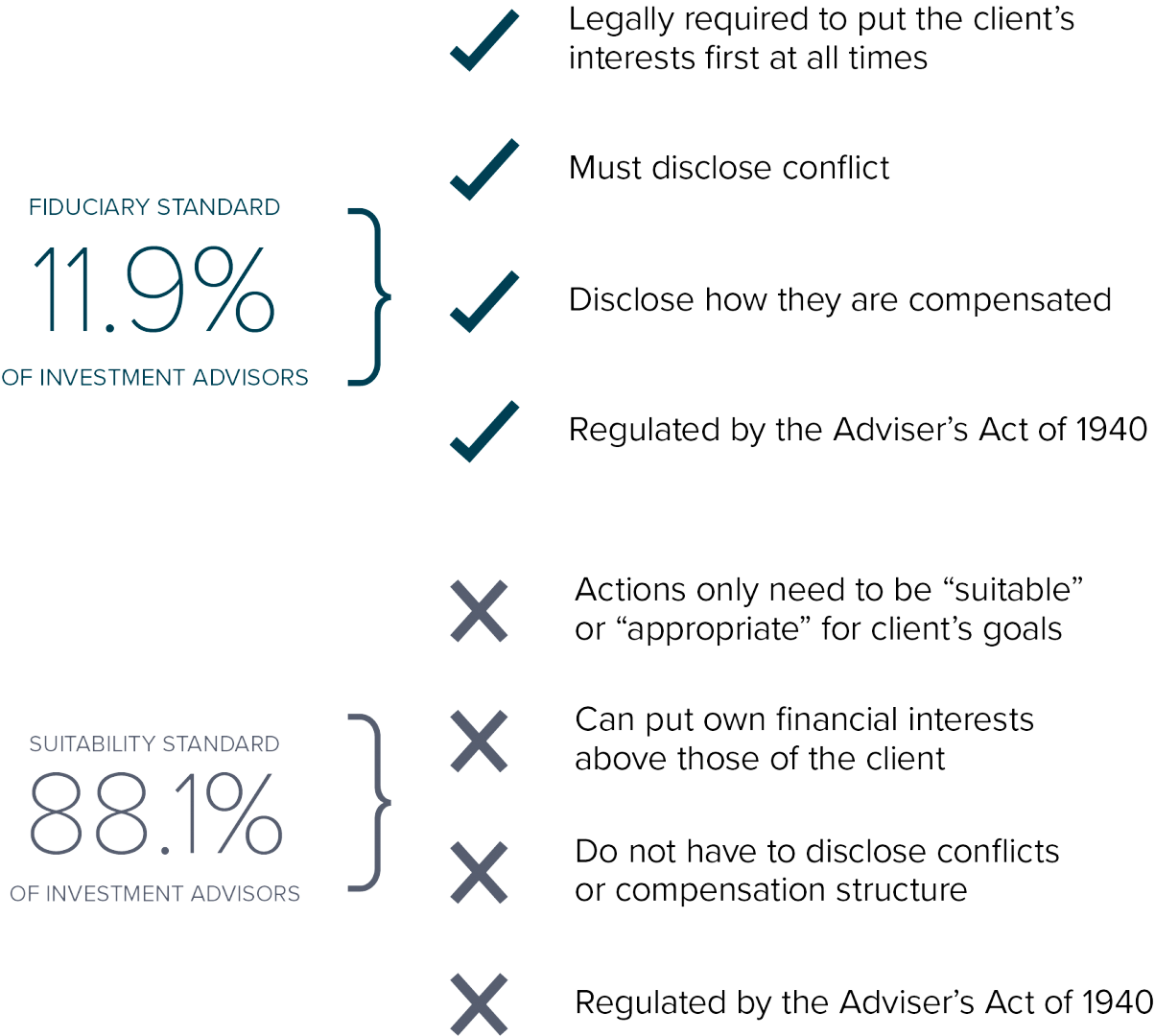The investment advice and financial service industry has been under an increasing amount of skepticism from consumers throughout the country, and rightfully so. We’re regularly confronted with headlines about misuse and abuse—the ethics crisis in the early 2000s, the great recession in 2008-2009, the multibillion dollar Bernie Madoff Ponzi Scheme, predatory loan markets, advisor misconduct at Wells Fargo, and most recently the default change in sweep vehicles at banks and broker dealers.
For many high-net-worth individuals and families, it’s hard to trust that any financial service has your best interests at heart at all times. And unfortunately, the numbers support the narrative. A surprisingly low 11.9% of investment advisers operate in a fiduciary capacity for all advice they provide. At Sanderson, we’re proud to be part of this minority within our industry, and this article explains why.
What does fiduciary standard mean?
The National Association of Personal Financial Advisors (NAPFA), an industry group of which our firm is a member, defines fiduciary as “a professional entrusted to manage assets or wealth while putting the client’s best interests first at all times.” A fiduciary advisor must disclose any potential conflicts, adopt a code of ethics, and disclose how they are compensated. Furthermore, Registered Investment Advisors (RIA) are regulated by the SEC and are legally held to the fiduciary standard of care.
On the other hand, advisors who are not classified as fiduciaries must follow only the suitability standard. As the name suggests, this means an advisor’s recommendation to be deemed only suitable or appropriate (but not necessarily best) for the client.
It may seem counterintuitive that 88% of the 320,000 self-identified investment advisors do not have their clients’ best interests at heart at all times across all decisions, but the data shows that suitability is the preferred standard for profit-seeking broker-dealers, often owned by public companies that have a duty to generate the most profit for their shareholders.

Difference between fiduciary and suitability standard.
What’s the problem with suitability? Well, there are a few. First, the transparency of advisor compensation. As long as the action is suitable for the goals of the client (which is not a high bar to clear), an advisor can sell a product that may pay them more than an alternative option. In that scenario, it’s clear who the primary stakeholder in the relationship is, and whose interest comes first.
It’s also the case that some advisors are dually registered as both a broker-dealer (regulated by the SRO FINRA) and an RIA. This scenario is confusing to consumers and regulators, but the core message is that while providing certain types of services to their clients—such as insurance review or other types of financial products—the suitability hat can be worn, and best-interest stakeholder can change from the client to the advisor.
How to evaluate financial advisors.
So what can you do to make sure your financial interests are best being served? Here are a few questions you should ask while interviewing a prospective wealth manager to establish a transparent arrangement:
- What is your revenue model?
- What codes of ethics and regulations do your advisors follow?
- Does your firm offer an open architecture or limited investment platform?
- What qualifications do your advisors hold?
- Will you sign a Fiduciary Oath?
You can also refer to this Financial Advisor Checklist produced by NAPFA. It’s a great tool for helping you in your due diligence process while selecting a new advisor.
In a heavily conflicted industry, there are many different approaches that may be suitable for investors, but we think the best way is an ongoing continuous advisor relationship with a fee-only, fiduciary-only advisor. This designation ensures that we are providing our clients with honest, objective advice based on our extensive experience, education, and governing bodies throughout the entire advice relationship.
Disclosure
This publication contains general information that is not suitable for everyone. All material presented is compiled from sources believed to be reliable. Accuracy, however, cannot be guaranteed. Further, the information contained herein should not be construed as personalized investment advice. There is no guarantee that the views and opinions expressed in this publication will come to pass. Past performance may not be indicative of future results. All investments contain risk and may lose value. © October 2019 JSG
Let’s talk about your future.
Schedule a consultation to learn more about our investment services.
Filter Blog Posts
SUBJECT
- Investment Consulting (160)
- Financial Planning (144)
- Tax Consulting (44)
- Estate & Generational Wealth Planning (15)
- Firm News (11)
- Lessons Earned (11)
- COVID-19: Market Watch (10)
- Community (4)
- Philanthropy (4)
- Business Succession Planning (3)
- Prosper Financial Wellness (3)
- Ukraine: Market Watch (1)
AUTHOR
- Angelo Goodenough
- C. Michael Bader, Esq., MBA, CPA, CIMA®
- Caleb Jennings, MBA, CFP®, CIMA®, AIF®
- Cameron Radziwon, LSSBB
- Debbie Todaro
- Evan Kraft, CFP®, CRPC®
- James Warner, MBA, CPA, CFP®, CIMA®
- Joe Bartelo, CPA
- John Gullo, MBA, CFA, CFP®, CIMA®
- John Sanderson, CPA, CIMA®
- Justin Sanderson, MBA, CFP®, CIMA®
- Karen Nicpon, CPA
- Phil Frattali, CFA
- Regyna Waterhouse
- Sanderson Wealth Management
- Tim Domino, CPA, CFP®
- Tucker Weppner, CFP®
